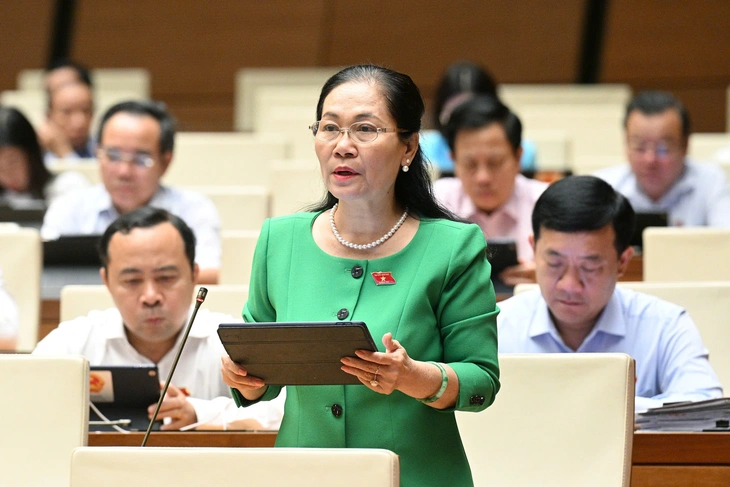
Delegate Nguyen Thi Le - Deputy Secretary of the City Party Committee, Chairwoman of the Ho Chi Minh City People's Council - Photo: Quochoi.vn
Agreeing with the viewpoint of decentralization and real delegation of power, along with increased accountability, delegate Nguyen Thi Le - Deputy Secretary of the City Party Committee, Chairwoman of the Ho Chi Minh City People's Council - said that in the past 10 years, many localities - especially large cities like Ho Chi Minh City - have encountered difficulties in balancing the budget, implementing public investment, as well as being proactive in managing finance and budget because current regulations have not created enough space for localities to make their own decisions.
Increase decentralization of authority
However, with the regulation on debt ceiling according to the percentage of revenue enjoyed according to decentralization (80% and 120%), delegate Le said that this calculation method does not accurately reflect actual capacity, and is not suitable for localities with large economic scale and high capital mobilization capacity such as Ho Chi Minh City.
Also, the city can completely borrow from ODA and issue government bonds to invest in key projects.
"In addition to decentralized collection criteria, it is necessary to add quantitative criteria such as GRDP, debt repayment capacity, credit rating and ability to mobilize capital in the financial and credit market.
The National Assembly 's permission for localities to have a budget deficit to invest in key projects with regional spillover effects also needs to be more clearly legalized," said delegate Le.
Sharing the same view, delegate Tran Hoang Ngan (HCMC) said that adjusting the increase in the outstanding loan balance of local budgets to meet development investment needs is necessary.
Because of the recent implementation of the Party's policy of local consolidation and merger, a huge amount of investment resources is needed, even though this may increase public debt.
Especially for Hanoi and Ho Chi Minh City, which have many large projects such as urban railways, Mr. Ngan said that the regulation of the ceiling of 120% of the local budget is not appropriate, so it should be expanded to 150% to 200% according to decentralization.
Regarding the revenue sharing percentage from VAT, the central budget enjoys 70% and the local budget enjoys 30%, or the revenue from land use fees and land rents, the local budget does not enjoy 100% as at present but only enjoys 70%.
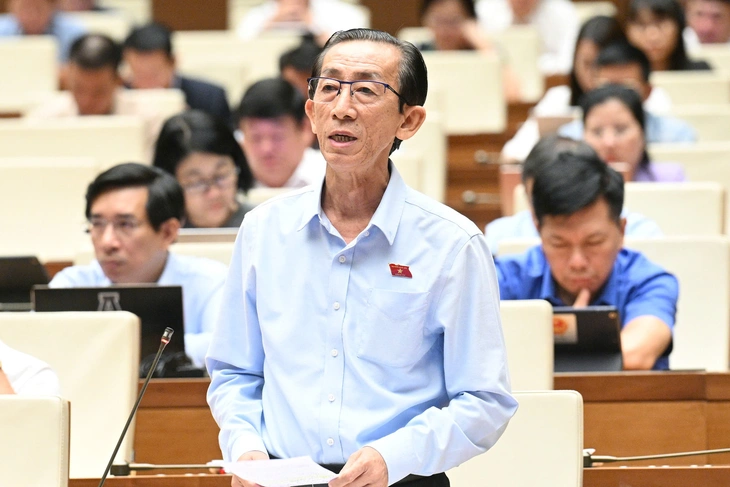
Delegate Tran Hoang Ngan - Photo: Quochoi.vn
Leave resources for local infrastructure investment
However, with the view that investment plans must be balanced for long-term stability, Mr. Ngan said that it is not appropriate for localities to only retain 70% of revenue.
Therefore, he believes that it is necessary to continue to maintain the regulations to set a double-digit growth target, promote local potential when merging, consolidating, and expanding development space, especially Hanoi and Ho Chi Minh City, which are localities with many large investment projects.
Citing Ho Chi Minh City, Mr. Ngan said that to meet public investment needs by 2030, the budget capital needed to be mobilized is 1.1 million billion VND. With land revenue of 550,000 billion VND, but 30% must be adjusted to the central budget, meaning a revenue shortfall of more than 33,000 billion VND each year.
The delegate said that this affects the city's public investment plan, especially the investment demand for the urban railway system of up to 40 billion USD, the road expansion projects connecting Binh Duong, Ba Ria - Vung Tau and the construction of bridges. "I think that in the next 10 years, this amount will not be collected, and if collected, it should only be at the level of 5-10%" - the delegate said.
Explaining, Minister of Finance Nguyen Van Thang said that accepting the opinions of delegates, the Ministry of Finance will continue to review the Government's report to submit to the National Assembly the appropriate division ratio between the central and local budgets (after deducting land revenue) in 2026.
In 2026, when the revised Budget Law takes effect, the ministry will advise the Government to submit to the National Assembly an appropriate allocation ratio to ensure stable and long-term development.
Proposal for the Provincial People's Council to have the right to decide on the internal division ratio
The Deputy Secretary of the City Party Committee suggested that in the context that localities are strongly implementing digital transformation, artificial intelligence, digital economy, etc., the law should allow the use of excess revenue and budget surplus to invest in data infrastructure, digitization of administrative procedures, innovation ecosystem, and green infrastructure development.
Regarding funds established by the central government, she said that it is necessary to allow localities to establish a number of extra-budgetary financial funds (according to the principles of autonomy, self-responsibility, and transparency) to meet specific needs, such as the Digital Transformation Development Fund, Urban Infrastructure Investment Fund, Science and Technology Development Fund, Innovation Support Fund, etc.
In addition, according to the delegate, the Provincial People's Council also needs to have the right to decide on the internal division ratio between budget levels; decide on the transfer of resources, use of surplus, allocation of capital for breakthrough programs, and unplanned situations; and approve key projects that have a major impact on the socio-economy.
Source: https://tuoitre.vn/dieu-tiet-30-thu-tu-dat-ve-trung-uong-tp-hcm-lo-thieu-nguon-lam-cac-du-an-lon-20250526115049336.htm





![[Photo] Prime Minister Pham Minh Chinh meets with Hungarian President Sulyok Tamas](https://vphoto.vietnam.vn/thumb/1200x675/vietnam/resource/IMAGE/2025/5/29/dbcaa73e92ea4448a03fe1d0de6d68e8)
![[Photo] Vietnamese and Hungarian leaders attend the opening of the exhibition by photographer Bozoky Dezso](https://vphoto.vietnam.vn/thumb/1200x675/vietnam/resource/IMAGE/2025/5/29/94d8ceca5db14af3bf31285551ae4bb3)



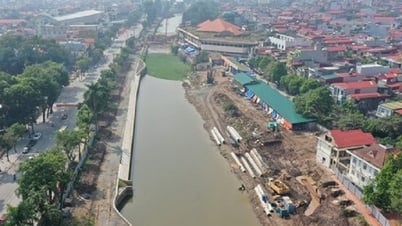

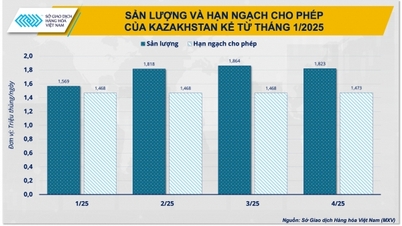



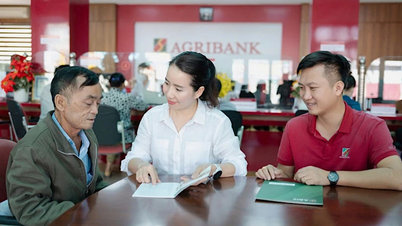







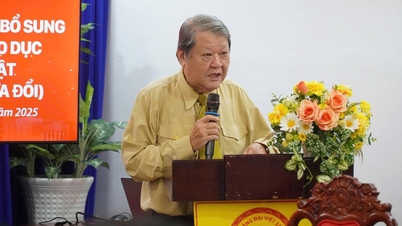




![[Photo] Prime Minister Pham Minh Chinh receives a bipartisan delegation of US House of Representatives](https://vphoto.vietnam.vn/thumb/1200x675/vietnam/resource/IMAGE/2025/5/28/468e61546b664d3f98dc75f6a3c2c880)















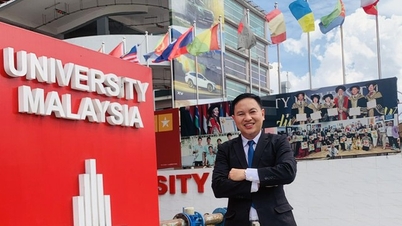








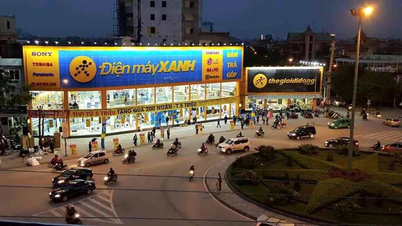
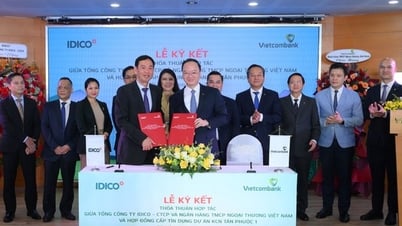





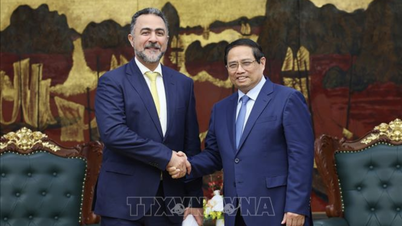


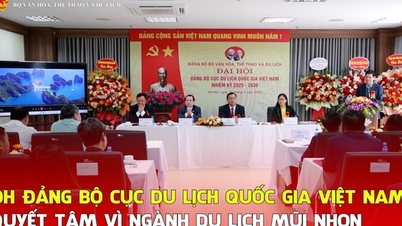







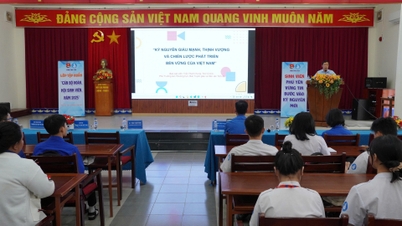















Comment (0)